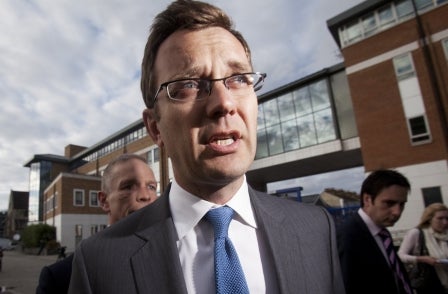
Andy Coulson today denied knowing that Milly Dowler's phone was hacked while he was in charge of the News of the World.
He did not know the practice was illegal but would have regarded it as "intrusive" and "lazy journalism", he told the jury at the Old Bailey hacking trial.
The Old Bailey has heard how Coulson was in charge of the Sunday paper in April 2002 when then editor Rebekah Brooks was on holiday in Dubai and the murdered schoolgirl's phone was hacked.
Giving evidence for a second day, Coulson, 46, said that before the Dowler incident he was only vaguely aware of accessing voicemails "in the ether".
Coulson, who was deputy editor of News of the World at the time, said: "I think I was aware of it in very vague terms. I think it was in the ether. It was something that was gossiped about maybe."
His lawyer Timothy Langdale QC asked: "Were you ever party to or in agreement with phone hacking at the News of the World?"
Coulson said: "No I was not."
Mr Langdale said: "In terms of the Milly Dowler story were you aware of any activity by the News of the World in relation to hacking Milly Dowler's voicemail messages?"
Coulson replied: "No I was not."
He was not aware, in the spring of 2002, that accessing someone else's voicemail messages was in fact a crime, Coulson told the jury.
But he said: "I would have thought it was intrusive, I would have thought that it was a breach of privacy, and I also would have thought that it was lazy journalism.
"My attitudes were formed by the people I had worked for and the kind of reporter that I was and neither the people I had worked for or myself as a reporter was interested in that – that kind of behaviour."
Coulson, of Charing, Kent, is charged with conspiring to hack phones with Brooks and Stuart Kuttner and conspiring with former royal editor Clive Goodman to commit misconduct in a public office.
All seven defendants deny charges against them.
Coulson said the atmosphere on a Friday and Saturday on the backbench was "frenetic".
But everyone at the News of the World, "from the reporter up", had a responsibility to keep an eye out for potential legal problems.
Asked if he read early versions of stories, Coulson told jurors: "I tended not to read early versions of material because they invariably changed."
Asked if he read every story before publication, Coulson said: "No, I would not have read every word and I would pick and choose what I would read."
Coulson said the term "phone hacking" was not around at the time.
On how it was done, he said: "I did not think I knew in any detail. I presumed it was to do with voicemail messages.
"I think I knew, possibly heard, that it was to do with access to these voicemails via PIN codes, that people have default PIN codes and therefore they could be accessed."
Earlier in the trial, Brooks gave evidence that she did not know Milly's phone was hacked until nine years after the event.
The revelation in July 2011 led to the decision to close the News of the World.
A number of calls and texts were exchanged between Brooks and Coulson in the days leading up to the News of the World's edition on April 14.
The court has heard that after private investigator Glenn Mulcaire hacked into Milly's voicemails in April 2002, picking up a voicemail about a job interview, the newspaper sent a team of reporters to
Telford, where it was believed it would take place.
But Coulson said: "I don't think I was aware that people were being sent to Telford."
He said he had a memory of a conversation in which he was told that Milly might be applying for, or taking, a job in a factory, but could not remember exactly how.
"It may have come out in conference… I have that memory in my mind and I am very clear about my reaction to it.
"I thought it was nonsense because Milly Dowler was a 13-year-old schoolgirl."
He said the teenager's picture had been in every national newspaper and her family also released "moving" video footage of her which had been shown by broadcasters across the country, and added: "The idea that she could walk into a factory and take a job just seemed ludicrous to me."
He went on: "The paper believed internally that, very sadly, the most likely probability was that Milly Dowler was dead.
"There was the suggestion, wholly incorrect, that her father was somehow involved.
"I remember that being the view internally – not fixed obviously, just information, from a very early stage."
Email pged@pressgazette.co.uk to point out mistakes, provide story tips or send in a letter for publication on our "Letters Page" blog

